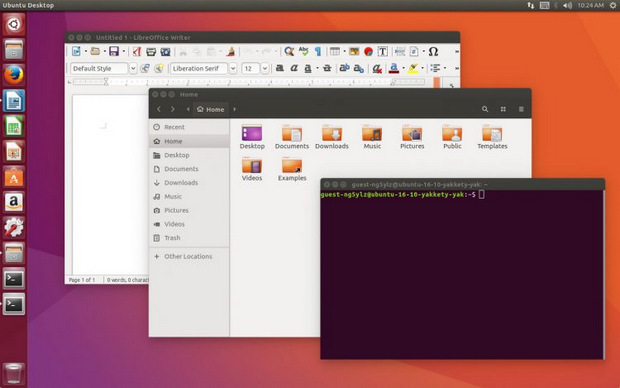 Versie 16.10 van Ubuntu Linux is uitgekomen. Tweemaal per jaar verschijnt er een nieuwe versie en vormen het jaar en de maand van uitgave het versienummer. Versie 16.10 heeft codenaam Yakkety Yak meegekregen en draait op Linux Kernel 4.8. Afgezien van bijgewerkte programma's is er ten opzichte van versie 16.04 niet zoveel veranderd. Zo wordt nog steeds versie 7 van Unity gebruikt en is ook Mir nog steeds niet ingeschakeld als standaard displayserver. Het is uiteraard wel als optie in te schakelen en datzelfde geldt voor de Developer Preview van Unity 8.
Versie 16.10 van Ubuntu Linux is uitgekomen. Tweemaal per jaar verschijnt er een nieuwe versie en vormen het jaar en de maand van uitgave het versienummer. Versie 16.10 heeft codenaam Yakkety Yak meegekregen en draait op Linux Kernel 4.8. Afgezien van bijgewerkte programma's is er ten opzichte van versie 16.04 niet zoveel veranderd. Zo wordt nog steeds versie 7 van Unity gebruikt en is ook Mir nog steeds niet ingeschakeld als standaard displayserver. Het is uiteraard wel als optie in te schakelen en datzelfde geldt voor de Developer Preview van Unity 8.
Canonical releases Ubuntu 16.10
Ubuntu, the platform used in the majority of cloud deployments worldwide, today released version 16.10 with hybrid cloud operations, bare-metal cloud performance, the ability to lift-and-shift 80% of Linux VMs to machine containers, Kubernetes for world-leading process-container coordination, full container support in OpenStack, and telco-grade networking latency enhancements.
“The world’s fastest hypervisor, LXD, and the world’s best cloud operating system, Ubuntu, together with the latest OpenStack and Kubernetes make for the world’s fastest and best private cloud infrastructure” said Mark Shuttleworth, who leads Canonical’s product team and the Ubuntu project. “Our focus is to enable true hybrid cloud operations, and this release further enhances the tools and platform that most companies depend on to operate effectively across all major public clouds and in one’s own data center, from bare metal to cloud container.”
Universal ‘snap’ Linux packages that merge container and packaging technology give developers a single format to distribute their apps and services from cloud to IoT. Snaps work on Ubuntu 16.10, 16.04 LTS and 14.04 LTS, and a range of Linux operating systems.“Rocket.Chat, the open source web chat platform had to support over 30 deployment platforms across many different on-premises and cloud solutions. Making Rocket.Chat available as a snap was a simple process which now means any user can install the service in a few minutes as opposed to requiring hours of configuration by a system administrator. This is definitely one of the easiest distribution methods we have ever used.” said Gabriel Engel, CEO of Rocket.Chat.
MAAS 2.0 – the “physical cloud” featuring IPAM and bare metal provisioning of Ubuntu, CentOS and Windows hosts is now highly available in standard configurations. MAAS enables a physical data centre to “feel like a cloud”, with on-demand availability of machines with custom images through a web or REST API. Total automation from the moment racks enter the building to the moment apps are running is the goal of MAAS.
The GA release of Juju 2.0 enables organisations to operate ‘big software’ applications like Hadoop and Kubernetes in a consistent, model-driven fashion across multiple public clouds and private infrastructure. Model-driven operations provide an ‘open source SAAS’ experience, transforming the process for application onboarding and with shared and crowdsourced operational code. Juju 2.0 added support for vSphere infrastructure, enabling private clouds on both OpenStack and VMware.
Network performance is a primary focus of this release, with updated versions of Data Plane Development Kit (DPDK), OpenVSwitch (OVS) and virtualization technologies, all able to handle critical application traffic for lower latency and greater throughput. Ubuntu 16.10 and the corresponding updates to Ubuntu 16.04 LTS further enhance Ubuntu’s position as the leading private cloud infrastructure operating system, with OpenStack Newton, DPDK, enhanced OpenVSwitch and LXD machine containers alongside regular KVM based VM guests.
Ubuntu 16.10 previews Canonical’s device convergence vision. Unity 8 developer preview includes apps that scale from phone to desktop, from mouse to touch screen, setting a precedent for the next wave of Linux devices.


:fill(white):strip_exif()/i/2003557274.jpeg?f=thumbmedium)